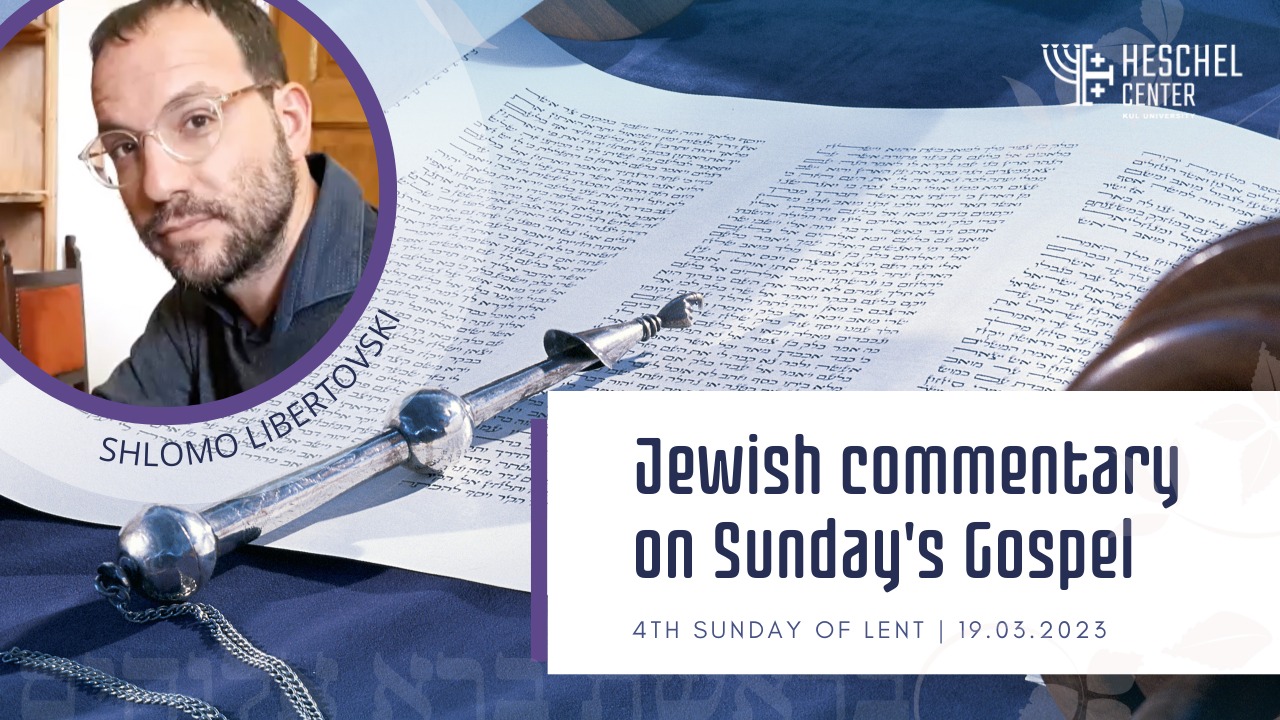Who sinned, the blind man or his parents?


Photo: KUL Heschel Center
Passing by a man blind from birth, the disciples asked Jesus whether he or his parents had sinned. Why such a question? Is there any connection to the Bible or Jewish tradition? – Shlomo Libertowski, a Torah lecturer at Beth Shemesh, writes about whether, according to the Hebrew Bible, children can bear the consequences of their parents’ sin – in a commentary for the Heschel Center of the Catholic University of Lublin. The commentary provides a more in-depth understanding of the disciples’ question and Jesus’ response in the Gospel of the Fourth Sunday of Lent (John 9:1-42).
“In Exodus 34:7 we read: +He [God] does not leave the guilty unpunished; he punishes the children and their children for the sin of the parents to the third and fourth generation.+ However, there seems to be a contradiction as we read in the Book of Deuteronomy 24:16: +Parents are not to be put to death for their children, nor children put to death for their parents; each will die for their own sin.+ (…) Every biblical paradox contains a lesson and a message,” Shlomo Libertowski emphasizes in the commentary.
The complete commentary follows:
In this Sunday’s readings we hear that “as Jesus passed by he saw a man blind from birth. His disciples asked him, “Rabbi, who sinned, this man or his parents, that he was born blind?” (John 9:1-2) Why are the disciples asking this question? Is there a connection to the Bible or the Jewish tradition?
In Exodus 34:7 we read: “He [God] does not leave the guilty unpunished; he punishes the children and their children for the sin of the parents to the third and fourth generation.” However, there seems to be a contradiction as we read in the Book of Deuteronomy 24:16: “Parents are not to be put to death for their children, nor children put to death for their parents; each will die for their own sin.” As we will soon find out every biblical paradox contains a lesson and a message. For now, let us follow the first thread.
We hear the echo of Exodus 34 in the Book of Joshua when it is forbidden to rebuild the city of Jericho: “At that time Joshua pronounced this solemn oath: Cursed before the LORD is the one who undertakes to rebuild this city, Jericho: At the cost of his firstborn son he will lay its foundations; at the cost of his youngest he will set up its gates.” (Joshua 6:26).
About five hundred and thirty years later (ca. 850 bc), during the reign of King Ahab, a man named Hiel of Bethel rebuilt Jericho. Just as God had said through the lips of Joshua, when he laid the foundation, he lost his firstborn son (Abiram); and when he set up the gates, he lost his youngest son (Segub) (1 Kings 16:34). We can ask if Hiel was ignorant of the warning. Maybe he grew up in a family that turned away from God, His ways and the Scriptures?
The sages teach that if the children follow the bad example of their mother and father they will inherit their bad ways, they will turn away from God and will eventually fall. It is very possible that Hiel followed his parents’ ignorance and paid a terrible price by losing his own children.
We find an interesting passage in Midrash that comments those kinds of situations. According to Ben Ezra God is patient but when the children persist in the sins, following their parents’ ways God eventually punishes them for their misconduct. Here the words of Deuteronomy 24 ring the bell and in this context, we see that they are not necessarily contradicting Exodus 34. How is it possible?
The children who have the inner strength to go against the current of their family’s ways can become a source of blessing for others. Abraham who according to the Jewish tradition didn’t follow the idle worship of his father Terah or King Hezekiah who introduced many religious reforms and renewed the spiritual life of his people and who also didn’t follow the wicked ways of his father king Achaz, can be great examples of such righteous conduct.
Jesus’ disciples were familiar with those Biblical figures. They were taught about the blinding power of sin and so they seek understanding upon seeing the condition of the blind man they are passing by.
About the author
Shlomo Libertowski, a Torah lecturer at Beth Shemesh and a member of Nostra Aetate 4 in Jerusalem, an ecumenical organization dedicated to Jewish-Catholic dialogue.
How did the seventh man change the life of the Samaritan woman? >>>
Who was transfigured on Mount Tabor – the disciples or Jesus? >>>
The Desert – A Blessing or a Curse? >>>
KUL Heschel Center: Misunderstandings over the „eye for an eye” principle >>>
Law, Prophets, iota – we need to examine the context to understand the meaning of Jesus’ words >>>
Heschel Center KUL: What do salt, light and the city on a mountain mean to us? >>>
Heschel Center KUL: Why did the disciples, becoming „fishers of men,” abandon their nets? >>>
Hebrew Commentary to the Sunday Gospel excerpt – 2nd Sunday in Ordinary Time; Year A >>>
Jewish Commentary on the Gospel >>>
Hebrew commentary on the first Sunday of the New Year Gospel >>>
Jewish commentary on the Christmas Gospel >>>
Hebrew commentary on the Gospel for the Fourth Sunday of Advent >>>



Od kiedy we Francji nie mowi sie po francusku ale po angielsku ?